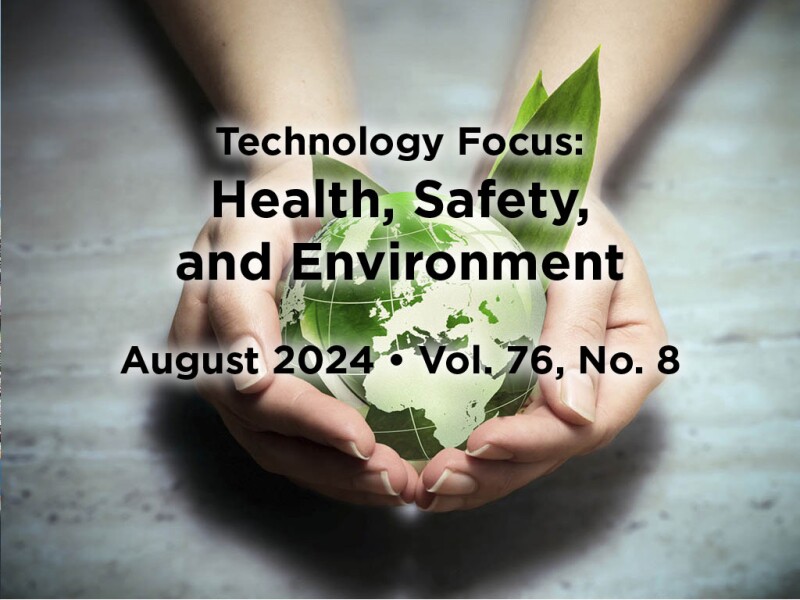This year’s Health, Safety, and Environment (HSE) Technical Focus feature showcases industry advancements in sustainability practices through use of new digital technologies and circular economy, decarbonization, ecosystem, and biodiversity principles.
Paper OTC 35396 graphically describes a holistic approach for industrial systems by strategic (outer) and operational (inner) circles integrating cybersecurity with process safety and human factors. Information technology, operations technology, and engineering technology converge to provide advanced opportunities for risk analysis, protection of critical systems, resilience of production systems, and personal and environmental safety, resulting in an integrated incident response.
Paper SPE 216385 presents how, as part of a strategy to advance environmental excellence, a national oil company implemented sustainable and circular decarbonization, ecosystem, and biodiversity initiatives at Abu Ali Island, Eastern Province, Saudi Arabia. The initiatives include development of mangrove nurseries and plantation campaigns, construction of the Abu Ali Fish Hatchery, repurposing 34 km of old subsea pipelines to become coral reef habitats, rerouting treated sewage water to an irrigation system, converting food waste to compost to be used as fertilizer for agriculture, and continuous beach-cleaning campaigns. These actions promote the company’s sustainability focus areas of climate change and energy transition, safe operations, and people development, thereby minimizing environmental impact and growing societal value.
Paper SPE 216338 describes how an operator implemented a new culture of circular decommissioning by applying the 3R circular economy principle—reuse, recycle, and reduce—during engineering and decommissioning of projects. To achieve asset-value maximization and CO2 footprint reduction, preused assets are reused for new projects and designs are created for long-life assets, products, and components. Modules and components are standardized to enable reuse and cost effectiveness, and assets and portions of assets are designed for reuse. This multiyear journey of the company’s new circular decommissioning culture begins with attention to its most-mature assets.
Many more examples of recent notable achievements in HSE can be found in the OnePetro online library or presented through local SPE section meetings, SPE Live, webinars, workshops, and distinguished lectures. Knowledge sharing, on the local and global levels, encourages collaboration and solutions generation.
This Month’s Technical Papers
Industrial Cybersecurity, Process Safety, and Human Factors: A 360° Approach
Circular Decarbonization and Biodiversity Initiatives Enhance Environmental Stewardship
Path to Green and Circular Decommissioning Explored
Recommended Additional Reading
OTC 35152 Environmental Assessment of Brent North Sea Decommissioning: A Detailed Case Study by Sthitadhi Maitra, Indian Institute of Petroleum and Energy, et al.
SPE 216313 The Dawn of Routine Satellite-Based Monitoring for Energy Infrastructure Is Now by R. Peter Weaver, Orbital Sidekick
URTeC 3866049 Deep-Learning Models for Methane-Emissions Identification and Quantification by Ismot Jahan, Los Alamos National Laboratory, et al.
OTC 35168 Generative Human/Machine Interaction in Oil and Gas by Sergio Gonzalez, Microsoft

Linda Battalora, SPE, is a teaching professor in the Petroleum Engineering Department at the Colorado School of Mines. She holds the Ben L. Fryrear Chair for Innovation and Excellence and is a Payne Institute for Public Policy Faculty Fellow and a Shultz Humanitarian Engineering Fellow. Battalora holds BS and MS degrees in petroleum engineering and a PhD degree in environmental science and engineering from the Colorado School of Mines and a law degree from Loyola University New Orleans. She is the program chair of the SPE Methane Emissions Management Technical Section and a member of the Business and Leadership Standing Committee; the Health, Safety, Environment, and Sustainability Advisory Committee; and the Production and Facilities Advisory Committee. Battalora is a past chairwoman of the Sustainable Development Technical Section and the SPE Diversity and Inclusion Standing Committee. She is an SPE Distinguished Member and was an SPE Distinguished Lecturer in 2019–20.

